Understanding the difference between synonyms and antonyms is crucial for improving vocabulary and mastering language skills.
These two key components of language play significant roles in communication, writing, and comprehension. While they both relate to words and meanings, they serve distinct purposes.
Synonyms offer words with similar meanings, enriching your language, while antonyms highlight opposites, allowing you to express contrasts clearly.
In this article, we’ll explore synonyms and antonyms in-depth, providing examples, worksheets, and lists to enhance your understanding.
Synonyms Or Antonyms Comparison
| Word | Synonyms | Antonyms |
|---|---|---|
| Benevolent | Kind, Charitable, Generous | Malevolent, Cruel, Unkind |
| Apprehensive | Anxious, Nervous, Concerned | Confident, Calm, Relaxed |
| Perspective | Viewpoint, Outlook, Angle | Bias, Prejudice, Misunderstanding |
| Happy | Joyful, Cheerful, Content | Sad, Unhappy, Miserable |
| Fast | Quick, Rapid, Speedy | Slow, Leisurely, Sluggish |

What Are Synonyms and Antonyms?
Synonyms

Meaning and Examples
Synonyms are words that have the same or similar meanings.
They can often be used interchangeably in sentences without changing the overall meaning.
For example:
- Happy and Joyful are synonyms.
- Quick and Fast are synonyms.
Using synonyms allows for more varied and interesting language.
It can prevent repetitive language in writing and speech.
Antonyms

Meaning and Examples
Antonyms, on the other hand, are words that have opposite meanings. Using antonyms helps express contrasts and differences in language.
For example:
- Hot and Cold are antonyms.
- Light and Dark are antonyms.
Antonyms help in expressing differences or opposing ideas clearly and concisely.
Synonyms and Antonyms: Why Are They Important?

- Enhance Writing: Both synonyms and antonyms allow writers to create more dynamic and engaging content.
- Improve Communication: Understanding synonyms and antonyms helps in conveying your message effectively, whether you’re speaking or writing.
- Vocabulary Building: Learning synonyms and antonyms can greatly expand your vocabulary, making your language more versatile.
Synonyms and Antonyms in Action: Examples
Synonyms in Sentences
- The happy child smiled at everyone.
- She gave me a joyful look after the good news.
These sentences show how happy and joyful can be used interchangeably, meaning essentially the same thing.
Antonyms in Sentences
- The hot sun made it impossible to stay outside.
- The cold winds made it worse as I walked back home.
Here, hot and cold provide opposite meanings that clearly define the environment.
Synonyms and Antonyms: Types
Synonyms and Antonyms for Different Words
Below is a table that lists common synonyms and antonyms for various words.
| Word | Synonyms | Antonyms |
|---|---|---|
| Benevolent | Kind, Charitable, Generous | Malevolent, Cruel, Unkind |
| Apprehensive | Anxious, Nervous, Concerned | Confident, Calm, Relaxed |
| Perspective | Viewpoint, Outlook, Angle | Bias, Prejudice, Misunderstanding |
| Happy | Joyful, Cheerful, Content | Sad, Unhappy, Miserable |
| Fast | Quick, Rapid, Speedy | Slow, Leisurely, Sluggish |
Synonyms and Antonyms for Specific Words
- Benevolent:
- Synonyms: Altruistic, Compassionate, Philanthropic
- Antonyms: Malevolent, Selfish, Malicious
- Apprehensive:
- Synonyms: Uneasy, Worried, Fearful
- Antonyms: Confident, Assured, Relaxed
- Perspective:
- Synonyms: View, Opinion, Approach
- Antonyms: Tunnel vision, Narrow-mindedness, Prejudiced view
Synonyms and Antonyms: Activities and Worksheets
Synonyms and Antonyms Worksheet
Test your understanding of synonyms and antonyms by filling in the blanks with appropriate words.
- The happy dog ran around excitedly. Its mood was completely ___________.
- Options: a) Joyful, b) Angry, c) Sad
- The teacher was feeling ___________ about the upcoming exam.
- Options: a) Apprehensive, b) Confident, c) Relaxed
- The ___________ weather made the trip more enjoyable.
- Options: a) Cold, b) Hot, c) Mild
Synonyms and Antonyms Activity: Fun Learning Exercise
- Synonym Match-up:
Create a list of words and have participants match them to their synonyms. For example:- Happy → Joyful
- Fast → Quick
- Big → Huge
- Antonym Swap:
Write a sentence using a word and ask participants to swap it with an antonym. For example:- The view was beautiful → The view was __________ (Ugly, Dull, Displeasing)
Common Mistakes with Synonyms and Antonyms
It’s essential to remember that not all synonyms are perfect substitutes. Sometimes, words that are synonyms in meaning may differ in usage based on context or tone.
For example, “benevolent” and “kind” both mean good-hearted, but “benevolent” has a more formal and philanthropic connotation.
Likewise, antonyms can be tricky when dealing with words that have multiple meanings. For instance, the antonyms of “light” could be “dark” (in terms of color) or “heavy” (in terms of weight).
How to Improve Your Synonyms and Antonyms Vocabulary
Use a Thesaurus
A thesaurus is a valuable tool for discovering synonyms and antonyms.
Regular use will help you identify alternative words and expand your vocabulary.
Read Widely
Reading different types of content—books, articles, fiction, and non-fiction—exposes you to a variety of words and their synonyms and antonyms in different contexts.
Practice Regularly
Make a habit of using new synonyms and antonyms in your daily conversations and writing.
It’ll help you remember and integrate them into your vocabulary.
People Questions
1. What is the difference between synonyms and antonyms?
- Synonyms are words with similar meanings, while antonyms are words with opposite meanings.
2. Can synonyms be used interchangeably in sentences?
- Yes, synonyms can often be used interchangeably without changing the overall meaning of a sentence.
3. What is the importance of antonyms?
- Antonyms help in expressing contrasts, clarifying ideas, and making language more dynamic.
4. How can I improve my understanding of synonyms and antonyms?
- Use a thesaurus, read widely, and practice using new words in daily conversations and writing.
5. Are all synonyms perfect substitutes for each other?
- No, some synonyms have different connotations or are used in specific contexts, so context matters when choosing words.
Conclusion
In summary, understanding the difference between synonyms and antonyms is key to mastering language.
Synonyms allow for variety and richness in expression, while antonyms help contrast and clarify meaning.
By learning and using these tools effectively, you can enhance both your written and spoken language skills.

Sophie Mitchell, a seasoned English educator, brings her passion for language and years of teaching expertise to TalkSpeaker. With a knack for simplifying grammar and expanding vocabulary, she empowers learners to master English with confidence.




